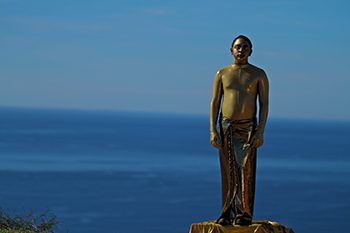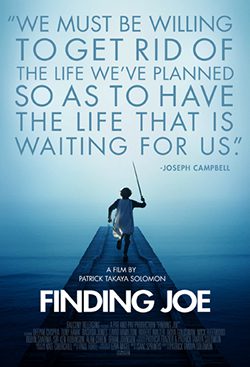I have had the pleasure of viewing and reviewing the movie, Finding Joe that focuses on the teachings of the late great mythologist, Joseph Campbell.
Notable authors, teachers, and athletes are interviewed.The film is beautifully edited and visually appealing, the mythical characters are portrayed by children in playful costumes, acting out the features of the mythical “hero’s journey.”
Robert Walter President of the Joseph Campbell Foundation says the most important function of myth is “to go beyond what we perceive as the limits of our possibility” and thus begins the the Hero’s Journey of confronting and overcoming adversity.
Unlike the Secret, The Cure Is …, and other productions that invoke the law of attraction, Finding Joe stays firmly grounded in reality. While idealized at times, it present an important, optimistic message that is relevant to all of us. We all undergo the Hero’s Journey in some fashion, especially when inviting mindfulness into our lives.”
The film focuses on three aspects of the Hero’s Journey–separation, the call to adventure, and returning home. We can find these same transitions with mindfulness practice. We find ourselves separated, asleep, cut off from being fully alive. We live inside of our heads instead of our bodies, separated from the lived experience that is right here, right now. To practice is to acknowledge this separation and accept the “call to adventure.”
This adventure has a strong interior component. We explore our minds with all their imperfections: fears, doubts, and what Deepak Chopra (one of the invited interviewees) describes as “bundles of conditioned reflexes” (love those spangly glasses, Deepak). The call to adventure is a call to our dark side, our human side; it embraces adversity rather than trying to eliminate it as the law of attraction attempts to do.
Often adversity is the catalyst. Instead of the law of attraction view of unforeseen or unwelcome happenings (we attracted it and that adversity is bad) the mythological approach is open to adversity. This is consistent with equanimity. The call may come from inside our minds or from the environment. First, we must pay attention. Next we must be open. Then take responsibility by embracing the possibility that each moment presents. We relinquish preferences to greet whatever arrives with stillness, interest, and resolve.
We return home each time we come back to our breathing when the mind has wandered. The journey is a one time destination but a metaphor (for the metaphor impaired as one of the contributor’s opined) for revolution. We keep coming back from exile through the very stuff of our lives–the beautiful stuff and the ugly stuff–finding value in all of it.
Adversity is not an encumberance it is the very path to transformation. When we become intimate with those bundles of conditioned reflexes, they start to lose their power to influence us, little by little. We cannot become liberated or awakened without going through the challenges, disappointments, and unexpected losses.
Mythology, like good fiction, shows us rather than tells us about the truth. We have very little to turn to other than mythology–the ancient ones and the modern ones provided by real life sport figures and  fictional box office superheroes. I like the way the film features a clip from Iron Man 2 to make the point. I think we are myth-deficient as a culture and this is a problem because we are cut off from rich sources of meaning. While I love Iron Man and the Avengers and the Dark Knight, there are few real personages I can turn to to provide the hero’s guidance.
fictional box office superheroes. I like the way the film features a clip from Iron Man 2 to make the point. I think we are myth-deficient as a culture and this is a problem because we are cut off from rich sources of meaning. While I love Iron Man and the Avengers and the Dark Knight, there are few real personages I can turn to to provide the hero’s guidance.
Therefore, we must turn to ourselves. The Hero’s Journey requires courage that is not the absence of fear but our willingness to move forward when that fear is gripping us. We must reach for courage to have the conversations we need to have with others (and ourselves to figure out what we really want).
Follow Your Bliss, Campbell’s most famous saying is explored in depth. The claim is made that most people are too busy following conventional cultural norms to follow their bliss–that most people are in a trance (what Charles Tart called “consensus trance”). While I agree with this sentiment, it borders on an elitist view–few live out their calling; most live like sheep.
At the same time, the film suggests that everyone has the hero’s capacity. We here this from exceptional people who have overcome great adversity to reach success or have had great results pushing themselves along on the hero’s journey. They then write books about it and reverse engineer the experience and assume that everyone can be just like them. The advice is good but as all the informercials say in the fine print–individual results may vary.
Finding Joe invites the question: Can we all be exceptional? Why not find out? While your individual journey may not be epic, the invitation of the hero’s journey can be useful for initiating and sustaining change in your life. The journey may be no grander than the revolution of one breath and that circle can be the starting point for more profound change.
The movie is available on DVD now. I recommend it.


